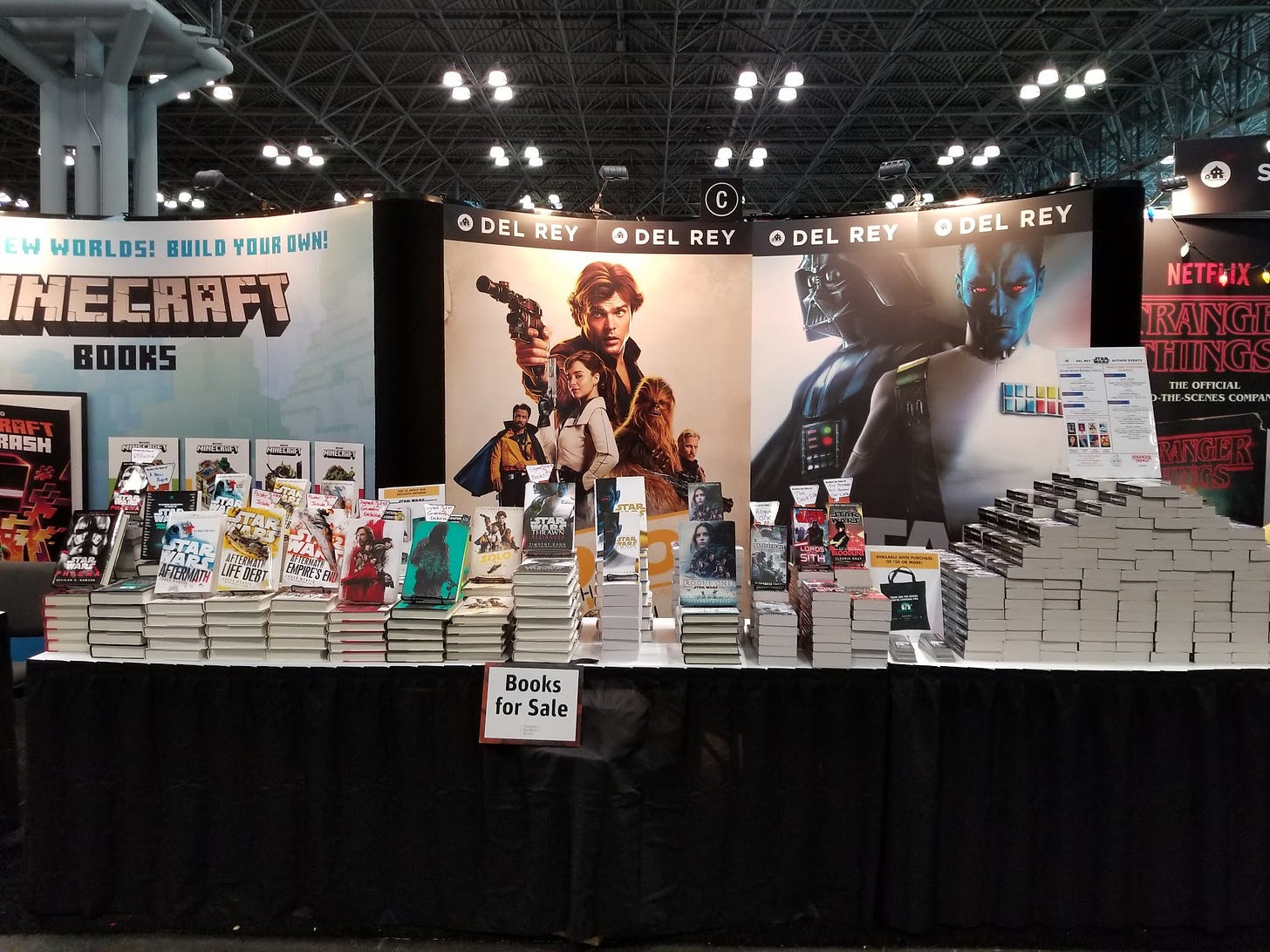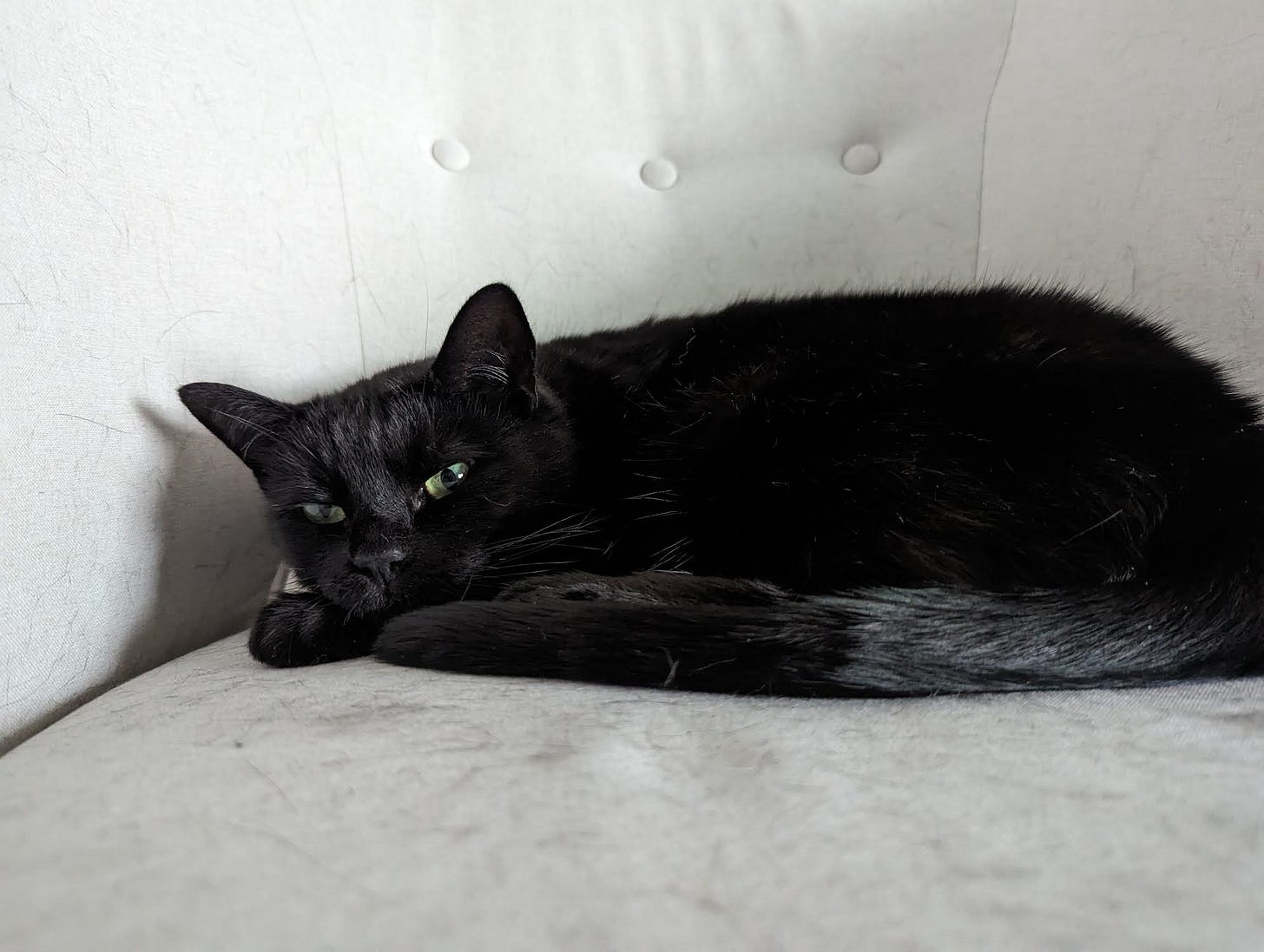I have spent most of the last decade living in other worlds. Far off galaxies, distant lands full of wonder, magical multiverses, and others. My job - is to take all of those weird, wonderful, strange, astonishing, and incredible places and help pull them onto the page from the games, movies, television, and other realms where they originate.
So let’s talk about how we do all of that.
Welcome back to The Cubicle At the End of the Galaxy. This week we’re exploring “licensed” publishing (sometimes called I.P. publishing) based on questions submitted by readers like you (special thanks to Margaux and others for the inspiration)!
What is licensed publishing? How does it differ from “traditional” publishing? Where do the authors and stories come from? And just how do those sorts of books get made? But before we get too specific, we need to talk a little bit about how publishing works in general.
We don’t need to break down all of the ins and outs of publishing - which would be too involved and get rather complicated. For this conversation, all we need to understand are some basics.
In general, the entire publishing process flows from the author. Stories (and thus manuscripts) originate with them and are then picked up by agents/publishers, or put through the self-publishing process, and eventually result in a finished book (of one format or another).
In general, the entire publishing process flows from the author.
So when publishers are looking to buy books, they are assessing complete stories as created by the author. They will also be interested in the author individually: their experiences, their voice, and how their perspective lends unique shape to the story. But all of that comes as part of a consideration for buying that specific story.
Little of what I’ve just explained is likely new or groundbreaking information. But as we start to talk about licensed publishing, this will help inform the differences, and how that impacts the entire process of making these books.
Licensed Publishing Broadly Defined
A basic definition: licensed publishing is when a brand whose primary product is not books, partners with a book publisher to create books as an extension of their brand. This includes novels, non-fiction books, graphic novels, and more. The book publisher is granted a “license” to develop and publish books subject to the brand’s approval (in this relationship the brand is referred to as the “licensor”).
(The name I.P. publishing gets used sometimes. I prefer the term licensed. It sounds better, licensed is more commonly used in the industry, and we all could do with probably 25% fewer acronyms in our lives. So I’m going to use “licensed” from here on out.)
The benefits for both sides are pretty clear. The brand gets to extend into a new area of entertainment, and the publisher gets to make books based on a world, characters, etc. with a pre-established audience. The brand also gets to utilize the expertise of the book publisher, which they may lack and don’t want to commit resources of their own to acquire or build.
Story —> Author
Remember our general statement about the publishing process, with everything flowing from the author and their story? Well in licensed publishing, things are different and somewhat inverted. By and large - licensed publishers aren’t going out to find/acquire stories, they’re going out to find/acquire authors. Why? Because they already have the stories set.
If that’s true, where does the story come from? The answer is - usually from within the partnership of the publisher and the licensor. Both sides, understanding the kinds of stories the brand wants to tell, collaborate to come up with the kernel of an idea. These can originate from a multitude of places. Perhaps the brand has a big movie coming out and they want to explore one of the characters more in a prequel story. Maybe a key event from the brand’s lore is finally going to be fleshed out. Or potentially, an individual on the editorial team has always wanted to answer an essential question about the brand’s worldbuilding.
I often refer to this process as defining a story sandbox or scaffold. These starter ideas aren’t complete stories, but they establish the bounds the story will explore. From there, the brand and publisher go out and find the right author to come and “fill” that sandbox and create an actual book from that scaffold. Usually starting with an outline, and then eventually various manuscript drafts.
Why Not Author —> Story?
So why don’t brands just out and solicit authors to pitch story ideas directly?
Well, it’s mostly an issue of efficiency and scope. Open or even directed solicits can yield lots of ideas, but how many of them will be usable? And do the publisher/licensor have time/resources to sift through all of them to find the viable ones? (spoiler: no, they do not)
In addition, most authors don’t have the same scope or visibility for everything that a brand is doing or focused on. The licensor and their publishing partner do!
Yes, a potential author might know about big movie A the brand is developing, but less likely that they know about the two other films, one tv show, big video game, and 5-10 books and comics. An individual author’s ability to deliver a story idea that didn’t overlap / outright contradict one or more of those projects is extremely low. So it would be a waste of everyone’s time. 1
How Does An Author Get Selected?
Once that sandbox or scaffold is defined, the publisher and licensor will discuss the kind of author they think can best develop the story - based on themes, types of characters, tone, genre, etc. And then they go out and assess a variety of authors who have those skills/experiences/points of view.
This is an ongoing process, even when there is no sandbox or scaffold to fill. Publishers and licensors will always be talking about authors they are discovering that they think might be a fit for a future project. Part of being a licensed book editor is to constantly assess the writing of different authors, talk to agents about clients who have an interest in different brands, and more. That way, when the right sandbox or scaffold comes along, you instantly have a few people who seem like the right fit.
But writing talent and passion aren’t the only factors in finding the right author. Two other qualities are often highly sought. One is experience, and the other is a collaborative spirit.
Experience is important not because experienced writers are “better” than less experienced ones. It’s what comes with that experience. Namely, a honing of the craft, an ability to take feedback, and a track record of hitting deadlines. Licensed books generally get made on much faster timelines than “original” books, and so having an author who can write under a constricted schedule, and confidently hit deadlines is required. The most reliable way to know if that is true for an author is by looking at their track record of previous published work.
Any book requires collaboration, but in licensed publishing that is amplified, since the author is coming into a situation with some amount of storytelling being dictated to them. But also, because at the end of the project - generally - the author doesn’t own or have the ultimate say over the final result. This leads us to this next, perhaps most important difference for licensed publishing.
A Difference in Ownership
Once an author is selected, and onboard, the overall process of making a licensed book closely mirrors that of other traditionally published books. The production steps and the marketing/publicity considerations, all exist in much the same way. But with one key difference that affects everything. The licensor is the owner of the final book, and holds the copyright - instead of the author or the publisher. For authors in this arrangement, the project is often said to be “work-for-hire”.
This means that pretty much every final decision about the book is subject to the licensor’s (brand’s) approval. From the story to the cover, to the book title, the marketing promotions, and more. Every published book is a work of compromise, but doubly so for licensed books. Particularly for authors who with their own “original” work have much more autonomy and control of the final story.
Every published book is a work of compromise, but doubly so for licensed books.
If a brand’s hero - Bob in this example - always wears a blue cape, an author can suggest that he switch to red for story reasons. But if the licensor decides “the cape must be blue”, then the cape will be blue.
In these situations, Being a licensing editor is as much about managing relationships as it is about stories, and helping the licensor and author all agree in a way that best serves everyone. An editor might ask: If Bob’s cape has to stay blue, is there another way for us to achieve the goal/impact/underlying effect that changing his cape to red would have had?
Would You Like to Know More?
As with anything in publishing, we’re only scratching the surface of this topic, and getting varied perspectives is helpful. As an editor, I’m just part of this equation. Here are two excellent resources that look at licensed publishing from other perspectives:
First: A similar primer written from the perspective of a literary agent - the great Eric Smith. It includes insights on both fiction and non-fiction IP publishing (and even includes a quote from yours truly!)
Second: A writer’s guide for IP publishing, specifically in the realm of Non-Fiction. Written by the ever-wonderful Amy Ratcliffe. (Amy’s newsletter is also well worth your time and inbox space)
Coming to the Cubicle in 2024…
That wraps up dispatches from the cubicle in 2023. Like most publishing folk, I’m headed into hibernation for the rest of December. But here’s a preview on some of the things in the works for next year.
Practical guides on “how I edit books”
the STET Sessions: Authors talking about their best/worst editing experiences.
A ridiculous, completely unnecessary - but illuminating - deep dive into the history of paper sizes.
Hope the holiday season treats you well, however, and wherever you celebrate. Thank you as ever for reading.
-Be Well.
As with anything else in publishing, there are exceptions and you will find some licensed publishers that take outside pitches. But those are the exception rather than the rule, and speaking from experience working with the largest entertainment brands for nearly a decade, this is how it works.








Your insight is extremely eye-opening and helpful, thank you for writing such extensive posts. I'm looking forward to everything that's to come in 2024!
Thanks for sharing my post, Tom, and thank you for all the insight, as ever!